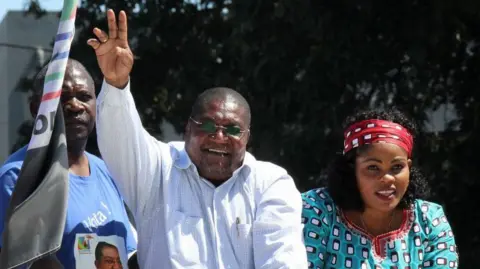ALTERNET
October 8, 2024

New York public workers opposed to the city's vaccine mandate protest on October 25, 2021(AFP)
Could the Covid disaster of 2020 — which Trump botched so badly that America has had more Covid deaths than any other nation in the world except Peru (whose president denied Covid was dangerous) — be what’s fueling the Trump MAGA cult? Are we, in other words, as a nation suffering from Post Traumatic Stress Disorder (PTSD), and that’s driving a national mental illness crisis that opened the door for Trump’s cult to grow?
— Colorado elections worker Tina Peters, for example, was just sent to prison for nine years for her role in trying to subvert the 2020 election; she’d completely bought into Trump’s lie that Democrats had stolen that election and is paying for it with the rest of her life.
— My barber was telling me this past weekend about how one of his regulars is stocking up on guns, ammunition, and dried food in anticipation of a second Civil War. This guy is now fully in the Trump cult and is thus perfectly willing to kill his neighbors for politics, once somebody declares the war is now underway (as many of these guys expect Trump to do in the next few weeks).
— All across America, families are being torn apart by the Trump cult, and sometimes the conflicts even lead to violence.
The rest of the world has figured this out. Over at the British newspaper The Independent, the headline says it all:
October 8, 2024

New York public workers opposed to the city's vaccine mandate protest on October 25, 2021(AFP)
Could the Covid disaster of 2020 — which Trump botched so badly that America has had more Covid deaths than any other nation in the world except Peru (whose president denied Covid was dangerous) — be what’s fueling the Trump MAGA cult? Are we, in other words, as a nation suffering from Post Traumatic Stress Disorder (PTSD), and that’s driving a national mental illness crisis that opened the door for Trump’s cult to grow?
— Colorado elections worker Tina Peters, for example, was just sent to prison for nine years for her role in trying to subvert the 2020 election; she’d completely bought into Trump’s lie that Democrats had stolen that election and is paying for it with the rest of her life.
— My barber was telling me this past weekend about how one of his regulars is stocking up on guns, ammunition, and dried food in anticipation of a second Civil War. This guy is now fully in the Trump cult and is thus perfectly willing to kill his neighbors for politics, once somebody declares the war is now underway (as many of these guys expect Trump to do in the next few weeks).
— All across America, families are being torn apart by the Trump cult, and sometimes the conflicts even lead to violence.
The rest of the world has figured this out. Over at the British newspaper The Independent, the headline says it all:
“She Escaped the Religious Sect She Grew Up In. Now She Says Trump’s MAGA Movement is Eerily Similar”
Although the economy right now is doing better than at any time since the 1960s, polls show a majority of Americans would rather believe Trump’s lies that inflation is still with us (it’s down to 1.7 percent now) and the historically low 4.1 percent unemployment rate is “fake news.” And tens of millions of Americans believe him.
So, what’s going on here in America? How did we get here and why?
Many otherwise normal and sane Americans seem to have gone nuts, leaping down the Qanon or Fox “News” rabbit holes in search of meaning, safety, and explanations for the feelings of doom that they just can’t shake. It’s as if some major event in their lives has created such a trauma that they’ve been knocked off balance, psychologically.
And that may be a big part of the answer, particularly given how neither our insurance industry nor our government-funded health insurance programs typically pay for mental health services that might otherwise help out people suffering from trauma-induced shock.
I still remember when I was on a flight out of New York in the late 1970s. Back then, planes took off in the middle of thunderstorms (and occasionally crashed as a result), and this 727 did exactly that. As we were climbing out through what was probably around 4,000 feet the plane was hit by a lightning strike, lighting up the cabin and killing at least one of the engines.
We started to fall out of the sky as the pilots struggled to stabilize the aircraft and restart the engine: the woman sitting next to me grabbed my arm and started sobbing; we all thought we were going to die. I was then (and still am) a licensed pilot and it scared me more than her, I’m guessing, because I knew full well everything that could go wrong to a plane in a thunderstorm, from the lightning strike taking out the jet’s electronics and engines to wind shear ripping us out of the sky. (It’s why they no longer fly through thunderstorms.)
It was at least a decade before I could get on a commercial plane without getting drunk first: That’s what untreated PTSD can do to you. (I finally did EMDR on it and am now fine on airplanes; this was a mild case, and didn’t lead me into a cult.)
Consider some of the cardinal symptoms of PTSD, something that’s often brought on by a near-death-experience, severe abuse, or surviving a once-in-a-century pandemic.
Each symptom would make a person more vulnerable to the siren song of Trump’s cult:
-— Hypervigilance and threat sensitivity, causing people to experience heightened alertness to potential and often imagined (like Trump’s lies about Haitian immigrants) threats.
— Difficulty with trust, which may lead to skepticism of official sources and greater reliance on alternative information channels; vulnerability, in other words, to Trump’s lies and his claims of “fake news” when he’s fact-checked.
— Emotional dysregulation, making individuals like Tina Peters, the hundreds of January 6th rioters now in jail, and other Trump followers more vulnerable to emotionally-charged misinformation and MAGA cult membership.
— Cognitive changes impacting critical thinking skills needed to evaluate information that might contradict the lies Trump and his co-conspirators promulgate.
— Social isolation which may limit exposure to different perspectives and fact-checking from others who try to tell MAGA members how deluded and exploited they really are.
— Seeking explanations causing people to have a heightened need to understand and make sense of their experiences, making them more open to MAGA’s anti-science and politically charged explanatory narratives, even when they’re lies.
— Avoidance behaviors leading people to avoid exposure to diverse information sources, keeping them trapped in Trump cult bubbles like rightwing hate radio and Fox “News.”
Multiple studies have been done on the psychological impact of the Covid pandemic, finding anywhere from 5 to 55 percent of Americans suffering in a way that could be diagnosed as PTSD. The average across the studies find 26 percent of Americans having diagnosable PTSD from Covid.
Prior to the pandemic, the national rate of diagnosable PTSD was generally considered to be around 3.5 percent: Clearly, the pandemic had an impact on our psyches that Trump has been exploiting every day since.
Remember, for almost an entire year, we were afraid that just going to the grocery store could kill us. Over a million of us — one out of every 272 Americans — died because of Trump’s incompetence and malice.
Most of us knew people who died; my best friend, Jerry Schneiderman, succumbed to the disease as did several other people close to our family. This is trauma writ large, setting millions up to believe any random BS a cult leader like Trump decides to dish out.
As the lead author of a new study on the impact of Covid, Dr. Jeff Ashby, noted:
“While many people are insulated from deaths and economic hardships related to the pandemic, there is a universal experience of fear, concern for others, and social isolation. Among our findings is that the experience of COVID-19 is a traumatic stress. It isn’t just triggering earlier trauma, it’s a traumatic experience in and of itself.”
Literally millions of people have joined Trump’s cult — it is a cult, as its members are so impervious to factual information and it’s based on the personality of a single man — and the evidence suggests that many of them may have been made vulnerable to joining MAGA because of the trauma they experienced during the worst of the pandemic.
As Dr. Stephen Schwartz wrote for the National Library of Medicine:
“[T]his [million-plus Covid] death rate is directly correlated to the politicization and weaponization of anti-science throughout the MAGA world created by Donald Trump and the Republican Party. … Anti-vaxxers, and anti-maskers, usually the same people, have made fidelity to a fact-free but emotionally satisfying reality more important than life itself, and created the first American death cult. …
“There was a deliberate plan from the very outbreak of the Covid pandemic to take what should have been a fringe movement — there were the equivalent of anti-vaxxers in the Middle Ages with the Plague; there were anti-vaxxers with the 1918 Spanish Flu — and transform it into a mainstream political movement. What had been fringe became a death culture involving millions. Believers willingly subject themselves to a vastly higher risk of contracting and dying of Covid. And they do this in the face of a million dead, and 2000 people, or more, dying each day.”
The good news is that the way most cult members leave their cult is not through deprogramming or a sudden awakening (although those do happen) but, rather, because the cult leader dies or is discredited.
Trump decisively losing the 2024 election may well be that discrediting and thus liberating event in the lives of many of his followers.
The challenge for the next year or so will be — for those of us who recognize the cult-like slavish devotion to Trump of his followers — to provide support to those followers we know to make the transition from the Trump cult back into the normal world. Therapy for the PTSD that made them vulnerable in the first place will also be helpful.
America can recover from this trauma, but it’ll take time and effort.
This all assumes, of course, that Trump loses this election. And making that happen is up to us: vote!








